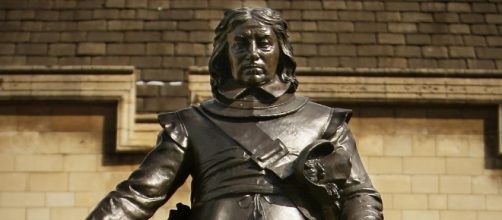In the wake of President #Donald Trump’s executive order for a Moslem ban, many in the United States hope that Christian ideology would be the sole basis or government action on issues such as abortion, marriage equality and other issues. While we await the next developments on the ban we should look back at the fate of the Christian Dictatorships of the past.
Oliver Cromwell
Singing and Christmas were once banned in England by a Christian fundamentalist. In the 17th century Oliver Cromwell was the Lord Protector of England, Wales, Scotland and Ireland as a result of his victory in the Civil War that followed the execution of Charles I in 1649.
Cromwell was a Puritan who tried to impose his religious beliefs with laws against blasphemy, cursing, drunkenness, and adultery and his power was enforced by a large standing army. He was firmly in power when he died in 1858, but the power structure he created soon fell apart after his death and the bloody struggles that followed were based on religion.
Inevitably the final outcome was a return to the Monarchy, but with one vital condition, until last year by law the British Monarch was not allowed to marry a Catholic. It is no coincidence that many of the Pilgrims and other sects moved to the British colonies in the Americas to find freedom that they did not enjoy in their country of birth.
John Calvin
Frenchman John Calvin was an important part of the Protestant Reformation who tried to put into effect the teachings that Martin Luther began when he posted his 95 theses in Wittenberg in 1517. These theses were in reply to corruption within the Church of Rome and were aimed famously against the indulgences where rich people could literally buy “forgiveness” and be guaranteed a place in heaven.
Like Cromwell in England Calvin had the opportunity to put his beliefs into action in Geneva where the only art permitted was music, but without instruments. Interestingly “impiety” and any opposition to his version of Christianity were punished. In fact the first five years of his rule saw 58 executions and 76 others exiled for religious reasons.
Although Geneva would remain an important city for Protestantism his severe form of the religion did not long survive his death.
Papal Dictatorship
For centuries Rome was a Catholic theocracy ruled by the Pope as an effective absolute monarchy where the ruler did not inherit by right of birth but was chosen by the Cardinals. As rulers the Popes played politics with other rulers and often took part in power games between warring monarchies.
Like the Dictatorships of Cromwell and Calvin the Papal State was not a benign power and ruled with an iron fist where execution and imprisonment were the punishment for those who opposed the Pope’s authority.
The Papal State or the “Pope King” as he was known to the Romans ended in 1870 when the Italian army took Rome 10 years after the proclamation of the Italian state.
The last two executions of the Papal State were two years before when Giuseppe Monti and Gaetano Tognetti were put under the guillotine for having placed a bomb in the barracks of the papal mercenaries killing at least 25 of them. An example which shows that “terrorism” is not a modern phenomenon.
When we look at Moslem terrorism now promoted by fanatic groups and the activities of ISIS and the Taliban, we must bear in mind Christian History. Our own past is no less blood thirsty.

